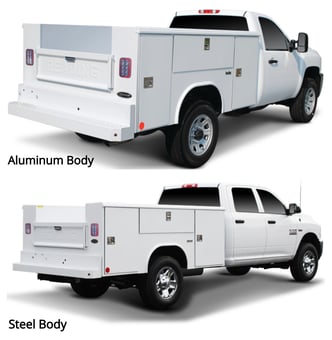
Traditionally in the industry for truck bodies, steel has been predominately used. While strength is one of the key advantages of steel, lately there has been an increasing number of truck makers and fleet owners turning their attention toward aluminum as a viable substitute.
There are many benefits to both steel and aluminum truck bodies. However, when deciding which option is best, a significant portion has come to favor the aluminum option due to the increased workload, fuel efficiency, and several other advantages.
Corrosion Resistance
One of the main benefits of aluminum truck models is the rust-resistant nature of aluminum alloys. Thanks to this rust resistance, aluminum is generally resistant to corrosion. Aluminum, by nature, forms an oxide layer along its surface that renders the metal resistant to corrosion in most cases. This protective layer of oxide shields the metal underneath from direct contact with air and moisture. As such, an aluminum truck body will generally be a lot more resilient in saltwater-dense air environments.
When it comes to steel, manufacturers must coat the metal’s surface with a galvanic layer of zinc. While the galvanic layer will protect steel from rust formation, this protection can get breached at any time. This would leave the exposed metal vulnerable to rust.
Durability
In combination with the durability added due to the corrosion resistance, aluminum bodies weigh less than steel and put less strain on the tires and fuel system. Because of this, the life expectancy of the engine and tires are likely to be longer in an aluminum-bodied truck.
Fuel Efficiency
A truck with an aluminum body will get more mileage per gallon thanks to the reduced amount of weight that the body places on the tires. An aluminum body can reduce the overall weight of a truck by roughly 50 percent. Likewise, the fuel efficiency of an aluminum-bodied truck is eight to 10 percent greater than that of a steel-bodied truck. For commercial trucking, the savings on fuel, reduced maintenance and tire wear and the increased load capacity translate to greater productivity and a healthier bottom line.
Environmental Friendliness
The production of aluminum is an eco-friendly process in which materials are recycled, and no harmful chemicals are used. When the parts of aluminum trucks are made, discarded metals are put to good use, and strong, efficient vehicles are pieced together as a result.
Aluminum production has also made it possible for automobile manufacturers to ease up on landfills and put discarded materials to better use. In fact, recycled aluminum products make up 85 percent of total aluminum.
Workload and Carrying Capacity
Steel is generally stronger than aluminum. As such, steel allows for more payload capacity than aluminum if you ignore other factors, such as the grade of the aluminum.
Another factor to consider is the lighter weight of aluminum, which allows auto manufacturers to produce truck bodies with thicker gauges of aluminum yet still retain the weight advantage. A sheet of aluminum is only a third as dense as a steel sheet of comparative thickness. Therefore, an aluminum truck body can be made with double the thickness, yet still be lighter weight than a steel truck of the same size and mass.
Maintenance
The amount of maintenance required for an aluminum truck body is generally minor in comparison to that of a steel-body truck. When it comes to the upkeep of an aluminum truck body, maintenance primarily consists of lubrication on the latches and hinges.
Thanks to the rust-resistant natural oxide that forms across the surface on an aluminum layer, there is no need to panic when a paint crack forms on the hood, roof or door of an aluminum-bodied truck. In fact, the paint on an aluminum truck body is purely aesthetic.
On a steel truck, the fight against rust is an ongoing part of maintenance, regardless of whether you have a fresh paint job and a galvanized truck bed. If a crack appears in the paint along any area of the truck body, rust could soon form if the problem is not remedied as soon as possible. Likewise, if the galvanized layer of the truck bed gets damaged, the truck will need immediate service work to prevent the formation and spread of rust and corrosion.
Ultimately, steel truck bodies have proven to be reliable for many decades. Nonetheless, aluminum bodies require far less maintenance, and this can be a huge money saver over the years that you own and operate an aluminum-bodied truck.
Contact us today to find which service body would fit best for your operation.